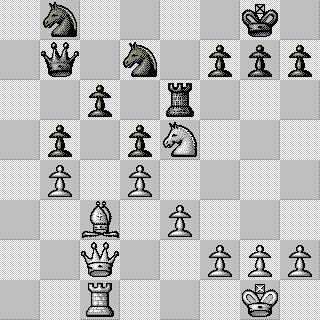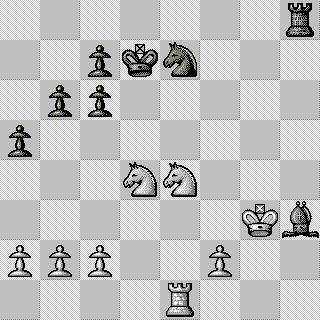
![]()

23.e4? An unexpectedly sharp and risky way of fighting for advantage and a mistake.
White could preserve a slight edge by 23.Ra1 Nb6 24.Qa2 Na4 25.Be1 Re8 26.Nd3 Na6 27.Nb2!
(after 27.Nc5 N4xc5 28.dxc5 Ra8 black equalizes due to 29...Nc7) 27...Nxb2 28.Qxa6 Qd7! 29.Qa7 Qe6
(exchanging queens is not bad but doesnít change the score: 29...Qxa7 30.Rxa7 f5 31.Kf1 Nc4 32.Rc7 Re6)
30.Ra6 h5 31.Qc5 Rc8 32.Ra7.
23...dxe4 24.Qxe4 Nb6!? Thatís the moment. Black is a little better because of the whiteís bishop.
Now he is taking the "d5" square under control and... 25.Bd2?? f6 26.Qg4 Qc8! The point.
The knight retreat loses the queen, although after 27.Nf3 Re1 28.Re1 Qg4 29.Re8 Kf7 30.Rb8
some chances remain, blackís position is winning. As well after 27.Bh6 Re7 28.Qh4 Nd5 29.Ng4 gxh6
black playing accurately enough soon converted an extra piece to a point.
It was a kind of luck, but saying itís a lottery you have to admit, that I have drawn one lot.
The next round brought me a win with white against one of the "over 2600" GMs Z.Sturua.
I am really proud of this game, in spite of several inaccuracies and mistakes from both sides,
because I won in Ruy Lopez, while my opponent is a well-known specialists in this opening,
and I was holding an advantage and tension during all the game. It was a hard battle, and for me it is
a subject for a separate article.
In the seventh round I had white pieces the second time in a row against Rozentalis. He is one of the
sample players of the Petroffís defence, so I had to confess that I had no opening against him very soon.
This game canít be called fighting for advantage. By this time I didnít consider myself as a likely winner.
I planned to survive with black and hope for possible luck to get white in the last round. But then I saw
that I was going to play against the young chechian GM T. Oral. He is dangerous, but suffers from terrible
time troubles. That was the first time I realized I had got my chance. I chose the proper opening - the
popular C67 endgame 1.e4 e5 2.Nf3 Nc6 3.Bb5 Nf6 4.0-0 Nxe4 5.d4 Nd6 6.Bxc6 dxc6 7.dxe5 Nf5 8.Qxd8+ Kxd8.
My opponent was wasting his time with extravagancy without improving his position, and I felt I was close
to overtaking the initiative, but I may have been overestimating my position. So when he reached his time
trouble, the position undesirably simplified in whiteís favour. After several inaccuracies from his side
I could equalize, but he had got only two minutes left, me having more than five! So I took a risk and drew
another lot.
![]()

27...c5?! I was aware, that after 27... Nf5 whiteís edge is minimal. 28.Nf6+ Kd8 29.Rh1?!
This case is a bit different than the one above. The blackís 27th move was more a trap than a part of a
strategic plan. One of the ideas was to frighten white with the continuation 29.Ne6 Be6 30.Re6 Nf5 and
31...Nd4 winning the pawn "c2" and getting chances to win. But after 29.Nf3 blackís position seems awkward,
although he can defend by 29...Bf5 30.Ne5 Rf8.
29...cxd4 30.Rxh3 Nf5+ 31.Kg4 Rxh3 32.Kxh3 Nd6 Another idea. It may be not so easy to defend the pawns
having less than two minutes. 33.Kg4? The simplest way was 33.b3 Nb5 34.Ne4 Na3 35.c3=.
33...Nc4 34.c3 34.Kf5!? deserved attention. 34...d3 35.Kf3 Nxb2 36.Ke3 c5 37.Nd5?
The decisive mistake. Now black supports his passed pawn and wins. After 37.c4 Kc7 38.f4 white retained
good drawing chances. 37...b5 38.Nf4 c4 39.Ne6+ Kd7 40.Nd4 b4 41.cxb4 axb4 42.Nf3 Kd6 0-1
After this game I stood a half-point ahead the tournament. My coefficient was the highest, so draw with
white against the other georgian GM G.Giorgadze would be enough to be the first in any case.
But as long as the prizes were not to be shared, for me the differenece between win and draw was only
6 ELO points. Thatís why the psychological advantage of my opponent was enormous, and I had apprehensions
about the result. But luckily the last round started early in the mourning, and because of it my opponent
was totally unwilling to fight, so he didnít try hard to beat me. I was very happy to accept draw,
because I have not won a strong tournament for several years.
GM Vassilij Yemelin